 MyDogBreeds
MyDogBreeds Chippiparai is originated from India but Beago is originated from United States. Chippiparai may grow 22 cm / 9 inches higher than Beago. Both Chippiparai and Beago are having almost same weight. Both Chippiparai and Beago has same life span. Chippiparai may have less litter size than Beago. Chippiparai requires Low maintenance. But Beago requires Moderate maintenance
Chippiparai is originated from India but Beago is originated from United States. Chippiparai may grow 22 cm / 9 inches higher than Beago. Both Chippiparai and Beago are having almost same weight. Both Chippiparai and Beago has same life span. Chippiparai may have less litter size than Beago. Chippiparai requires Low maintenance. But Beago requires Moderate maintenance
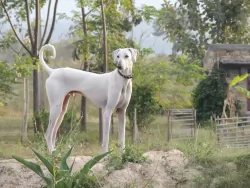 The Chippiparai is a working dog found in India and until recently there has been little interest in the purity of any breed, but rather only an emphasis on the abilities of the dog. They are only beginning to research the origin and history of their native dogs such as the Chippiparai. Not much is known about the origin of the breed except that it is found almost exclusively in Tamil Nadu and Keraia in the southern part of the subcontinent of India. Other than this there is much speculation about the breed’s origin but very little-known facts. It is indeed an ancient breed; however, its origin could be thousands of years ago or simply hundreds of years ago.
The Chippiparai is a working dog found in India and until recently there has been little interest in the purity of any breed, but rather only an emphasis on the abilities of the dog. They are only beginning to research the origin and history of their native dogs such as the Chippiparai. Not much is known about the origin of the breed except that it is found almost exclusively in Tamil Nadu and Keraia in the southern part of the subcontinent of India. Other than this there is much speculation about the breed’s origin but very little-known facts. It is indeed an ancient breed; however, its origin could be thousands of years ago or simply hundreds of years ago.
• Perhaps it is a descendant of the Saluki as it resembles this breed quite a bit. It has been believed for some time that the Saluki is the original sighthound and the source of all sighthound breeds. The Saluki was very popular in the Middle East, especially in Persia and Arabia from which it could easily have spread to India. It would then have been shared from Northern India to Southern India where the Chippiparai is found.
• Perhaps the Chippiparai is a descendent of sighthounds from Central Asia and Afghanistan – the Tazi, Taigan, Hortaya Borsaya or the Afghan Hound. This part of Central Asia had more trade, influence and contact with the Indian subcontinent early in their history than with any other region. The Chippiparai is considered by some to be more like these sighthounds than like the Saluki and the interaction between these regions has a much longer history than the Middle East and India.
• It is also speculated that the Chippiparai might have been developed completely and uniquely from the local street and working dogs. With the civilization of India being one of the oldest in the world, it is considered a possibility that the Chippiparai is the descendent of the Harappan hunting dogs that probably were developed by the Indus Valley or Harappa roiling class.
Wherever the Chippiparai came from, they were the exclusive property of the wealthy and ruling castes. These upper castes were the only ones that could legally hunt with dogs or afford to feed one. The royal classes of Tiruneivell, Thanjavur, and Madurai all fed the popularity of the breed among the upper castes. They were coursing dogs used to chase down the prey once it was sighted. The Chippiparai are incredibly fast runners and would catch almost any prey and either hold it or kill it for their hunter. The Chippiparai, when not hunting, had to be chained so they would not chase any small animal that they saw. This confinement also added to the purity of the breed as random breeding was prevented.
The southern part of the Indian subcontinent is extremely hot with routine temperatures over 100’. The Chippiparai was developed to withstand these extreme temperatures and is more heat tolerant than most any other breed. They also need very little food and are resistant to the many parasites and diseases found in southern India.
Harboring the belief that Indian dogs were not as good as European ones, the occupying countries of Portugal, France, and Britain, had no interest in the Chippiparai, again leaving the breed to develop naturally on their own with little or no interbreeding. They also received no formal recognition because Indian culture only valued the dog for its working abilities. There was no Indian Kennel Club until 1956.
The Chippiparai is now very rarely and only found in the area of its birth. Many believe the breed is in danger of becoming extinct and even though it is now registered with Indian Kennel Clubs it is not often shown in their dog shows. Lovers of the breed are now attempting to get Indians to recognize that the Chippiparai is a great companion animal and attempting to save the breed.
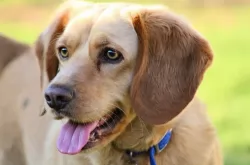 Made up of two purebred dog breeds, the Beagle and the Golden Retriever, Beago is kind of new breed. Some say that they were bred on purpose during the 1980s, in a desire to create a smart and loving dog that will be a smaller size than the Golden Retriever since this will make them ideal for indoor life.
Made up of two purebred dog breeds, the Beagle and the Golden Retriever, Beago is kind of new breed. Some say that they were bred on purpose during the 1980s, in a desire to create a smart and loving dog that will be a smaller size than the Golden Retriever since this will make them ideal for indoor life.
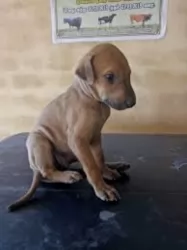 The Chippiparai is a typical sighthound although their size and appearance will vary more than that of registered purebred sighthounds. Typically, they will have a long, domed head with small erect ears and dark eyes. Their muzzle will be as deep and wide as the skull but longer. Their legs are straight and long, their chest is roached back and deep, giving them, an appearance very similar to a greyhound or other sighthound.
The Chippiparai is a typical sighthound although their size and appearance will vary more than that of registered purebred sighthounds. Typically, they will have a long, domed head with small erect ears and dark eyes. Their muzzle will be as deep and wide as the skull but longer. Their legs are straight and long, their chest is roached back and deep, giving them, an appearance very similar to a greyhound or other sighthound.
They have a long curly tail, and their coat can vary greatly in color. They are medium sized, and their coat is short, shiny and close. He is very slender and sleek, which along with his long legs gives him that incredible speed. They are thin with visible ribs.
 Beago is a medium-sized dog with a usually tri-coloured coat that can vary in some colours. They have usually short hairs because sometimes happens that they have longer hairs if the Golden retriever genes are stronger. Their hairs are soft to the touch and they don’t shed a lot and that makes them easy to maintain. They have dark coloured eyes, floppy ears, and they have the body shape of the Beagle, but they are very active and muscular like the Golden Retriever.
Beago is a medium-sized dog with a usually tri-coloured coat that can vary in some colours. They have usually short hairs because sometimes happens that they have longer hairs if the Golden retriever genes are stronger. Their hairs are soft to the touch and they don’t shed a lot and that makes them easy to maintain. They have dark coloured eyes, floppy ears, and they have the body shape of the Beagle, but they are very active and muscular like the Golden Retriever.
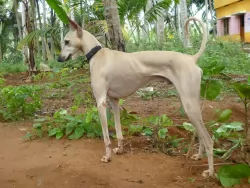 The Chippiparai is a loving, gentle family dog if well socialized, well trained and well exercised. They are very intelligent and need human companionship. Once they are living with a human family, they are very protective of that family. They are for the most part peaceful and quiet dogs. They are loyal and loving but they are not overly affectionate. Cuddlers they are not, and they do not like to play rough with children.
The Chippiparai is a loving, gentle family dog if well socialized, well trained and well exercised. They are very intelligent and need human companionship. Once they are living with a human family, they are very protective of that family. They are for the most part peaceful and quiet dogs. They are loyal and loving but they are not overly affectionate. Cuddlers they are not, and they do not like to play rough with children.
Accepting and loving within the family, the Chippiparai are equally hesitant and shy around strangers. They can be suspicious, but they are not aggressive. They are just very aloof with strangers, yet they hardly ever bark.
 They are very good with children of all age.
They are very good with children of all age.
Hunting, search, rescue dog, agility competitions.
Beago will love living in a house with a bog yard. As well, he will have a happy life in the apartments as long as you take him out for his daily activity. They get along with other pets, so any other dog or cat will be great company for him. They are usually well mannered in public places, if you train them and socialize, but they will always bark if there is someone strange in your house. They are very good with children of all age.
Beage is very smart breed. They will pick up new tricks very quickly and remember it forever. They would love learning new tricks once you include treats as rewards, but you must be careful not to overfeed him.
 There are no clinical studies regarding the health and health history of the Chippiparai, so little is known about their long-term health. However, most who know the breed, believe it is an incredibly healthy one. They seem to have a lot less genetically transmitted health issues than other purebreds. Because of their isolation for centuries in India, they have developed immunities and resistance to most parasites and diseases other dog suffer from.
There are no clinical studies regarding the health and health history of the Chippiparai, so little is known about their long-term health. However, most who know the breed, believe it is an incredibly healthy one. They seem to have a lot less genetically transmitted health issues than other purebreds. Because of their isolation for centuries in India, they have developed immunities and resistance to most parasites and diseases other dog suffer from.
Because of this you should look for the types of issues that occur in dogs of this size and build. Have them tested by the Canine Eye Registration Foundation and the Orthopedic Foundation for Animals.
 There are no general health issues with this breed. The health history shows that they have common health problems as any other active dog – problems with hips and elbows. Because of their floppy ears, they are prone to infections and diseases caused by lack of ear hygiene. Some of them have skin allergies. The best advice is always to make regular vet checks. Then you and your Beago can live a happy and long life.
There are no general health issues with this breed. The health history shows that they have common health problems as any other active dog – problems with hips and elbows. Because of their floppy ears, they are prone to infections and diseases caused by lack of ear hygiene. Some of them have skin allergies. The best advice is always to make regular vet checks. Then you and your Beago can live a happy and long life.
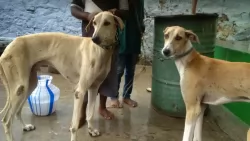 Do not overfeed your Chippiparai. Feed twice a day and no more than a total of 2.5 cups of high quality dry food.
Do not overfeed your Chippiparai. Feed twice a day and no more than a total of 2.5 cups of high quality dry food.
As mentioned previously the Chippiparai seems to have no genetic diseases or issues and very few acquired ones. However, he is sensitive to anesthesia and some foods. He is intolerant to cold weather and has a hard time with his pads on hard surfaces. Some Chippiparai might experience some of the ailments other breeds like them experience.
Both Elbow and hip are possible. This can cause arthritis and lameness. This occurs when the bone does not fit well into the joint.
This can cause lameness as well. The kneecaps slide over the knee instead of staying in place.
This is a hunting dog and he will want to hunt. They are incredibly fast and need the opportunity to run. Brisk walks will not be enough for this dog. He is very energetic. They will chase any small animals. It is not recommended that you have small pets even small dogs or cats with a Chippiparai. Having been bred for centuries to hunt, they are not likely to respond to any commands if they are off lease and chasing prey. Do not allow them to be off leash unless in a fenced area, and that fence needs to be 8 feet tall as they can easily jump a seven-foot fence. Try they at coursing, agility, fly ball and frisbee competitions.
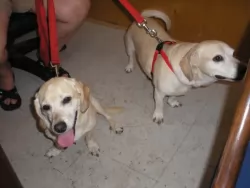 The best tip is to feed them with quality dry food. Canned food can be given once in week or less. They will love cheese and meat in their meal. Since they like to munch, they will eat almost any raw fruit or vegetables. Until you Beago is six months old, feed him tree time per day. Keep the feeding schedule unchanged to form a habit and avoid problems with metabolism.
The best tip is to feed them with quality dry food. Canned food can be given once in week or less. They will love cheese and meat in their meal. Since they like to munch, they will eat almost any raw fruit or vegetables. Until you Beago is six months old, feed him tree time per day. Keep the feeding schedule unchanged to form a habit and avoid problems with metabolism.
Since they don’t shed a lot, grooming your Beago will be easy. They won’t need an everyday brush, but it will be good if you could brush him two times per week and bathe once in a month. Their floppy ears need regular care as well. They need to be cleaned with the ear cleaning solution at least once a week. They will need regular nail trimming as well. They need quality food because they are very active dogs. Make sure not to overfeed them. Daily activity is a must.
Beago is very active breed. They like to spend time outdoors, running, playing fetch, jumping. They will love visiting the dog park or any park that is close to your house. They are very good if taken hiking.